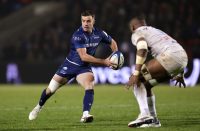 Billy Vunipola‘s decision to leave Wasps and join forces with his brother, Mako, at Saracens is surprising given that he is only in his second season in the Premiership with a club which is not only back on track, but on the rise after last year’s relegation battle.
Billy Vunipola‘s decision to leave Wasps and join forces with his brother, Mako, at Saracens is surprising given that he is only in his second season in the Premiership with a club which is not only back on track, but on the rise after last year’s relegation battle.
Wasps may not have the cash that Saracens do, but they have a young team with a generation of players, such as Joe Launchbury, Christian Wade, Elliot Daly, Joe Simpson, Sam Jones and Tom Lindsay, which should be capable of giving his new club a run for their money over the coming years.
The Wasps director of rugby, Dai Young, was unhappy that the20-year-old No.8, who had been nurtured by the club since his teens, and had been given his big break this season – and taken it in style – did not show more loyalty.
When the Vunipola loyalty issue was raised recently with TV pundit Will Greenwood, the former England centre ridiculed the ‘old school’ idea that any player would stay put if they were offered the chance of joining a club with as many high-calibre players as Saracens, for significantly more money.
There is another side to the coin. Greenwood’s fellow World Cup winner, the talismanic England No.8 Lawrence Dallaglio, was offered significantly more money by clubs in England and France to move at various stages throughout his illustrious career, and yet Wasps was good enough for him. Dallaglio remained a one club man, and thechemistry at Wasps during his era was powerful enough to result in them joining Leicester as the most successful English teams of the first 15 years of professionalism.
So far, despite the deep pockets of Saracens main shareholders, Nigel Wray and Johann Rupert, the club has not come close to emulating the Wasps feat of winning two Heineken Cups and four Premiership titles, including a famous double in 2004. That they are determined to change that was reflected this week in the announcement that they had not only signed the younger Vunipola, but had also succeeded in tempting the highly rated Samoan tighthead, James Johnston, to join them from Harlequins.
However, as Mourad Boudjellal has discovered at Toulon, signing one big-name player after another is not an instantaneous recipe for success because new superstar teams, however talented, still take time for the chemistry to blend – and sometimes, if the egos involved are too big or adversarial, it never does.
 To be fair, the work ethic and team spirit at Saracens appears strong, and the claim that their rotation policy has helped to foster this adds up – although the rotation is not as rigid in the case of key players as it is for squad players. However, given that there are a number of other talented No.8s on their roster in Ernst Joubert, Jackson Wray and Kelly Brown, it is possible that Vunipola will not get the game time for Saracens that he enjoyed at Wasps, or be as central to the way the team plays.
To be fair, the work ethic and team spirit at Saracens appears strong, and the claim that their rotation policy has helped to foster this adds up – although the rotation is not as rigid in the case of key players as it is for squad players. However, given that there are a number of other talented No.8s on their roster in Ernst Joubert, Jackson Wray and Kelly Brown, it is possible that Vunipola will not get the game time for Saracens that he enjoyed at Wasps, or be as central to the way the team plays.
Vunipola is a 20 stone giant who needs to be on the pitch as often as possible to stay match fit, and also to glean as much experience at Premiership level as he can get – and the same experience factor applies to a talented rival like the 22-year-old Wray. While Saracens have not exactly cornered the market in promising No.8s, they will have two vieing with the veteran Joubert for the No.8 shirt every weekend, so, while Vunipola’s bank balance might not have been quite as flush had he stayed with Wasps, his prospects of playing regularly would be better. There is nothing more frustrating in the English game than watching good young players drift into arrested development territory due to lack of Premiership exposure.
Greenwood will remember that his own career hit the buffers at Leicester, then the country’s most successful club, when a combination of injury, inconsistent form, and the arrival of the Aussie international Pat Howard, resulted in him getting very little first team action and eventually returning to Harlequins.
Billy Vunipola is an impressive talent, and although he shares strong similarities in style with Louis Picamoles, the powerhouse Toulouse and France No.8, his greater dynamism makes him even more dangerous to defences than the Frenchman. Having signed him, it is incumbent on Saracens to ensure that his career does not stall.
As for Jackson Wray, if he is concerned about spending more time than is good for him on the touchlines, his best move might be to head in the direction of a club where he’ll get more game-time, and Wasps fit that bill.
The other thorny issue raised by so many high profile Saracens signings is how they are managing to stay inside the £4.5m Premiership salary cap given the market rate for player wages. They have been given the rubber stamp of approval by the Premiership’s own watchdog but, as ever, the devil is in the detailed accounts – and they are not available to anyone but the watchdog.
No doubt the answer is that, like Leicester, players are joining Saracens at below the market rate simply for the privilege of playing for such a great club.






















